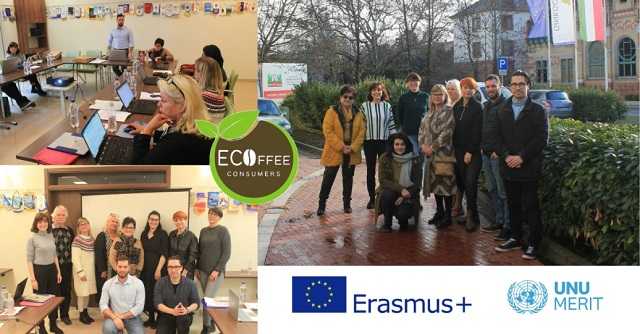MAASTRICH, The Netherlands – Maastrich University has joined The Erasmus+ ECOffee Project On Sustainable Coffee Consumption. This 2 years ERASMUS+ project aims to develop innovative educational methods to promote sustainable consumption habits to adults. In particular, the project will be targeted to producers and consumers in the coffee industry.
The goal of the project is to utilise existing and develop new tools and methods based on the principles of Technology Enhanced Learning to trigger transformative, systemic change in consumption habits and incentive people, and especially millennials, to turn to more sustainable ways of life. UM joins as a scientific partner to provide guidance for the development of the educational tools and nudge strategies.
Project description
In our days, incredible political and social weight concentrates on the decrease of contamination emerging from industrial and agricultural activities and also from other human activities that produce large quantities of waste. Food waste is an increasing waste stream that needs to be managed with great concern and is attracting increasing attention due to its environmental, social, and economic impacts.
Such wastes are the Spent Coffee Grounds (SCG), a rising risk in a magnitude of millions of tons annually, inevitably derive from the rapid increase of coffee consumption worldwide, and the lack of a solid waste management mechanism.
The ECOffee project has three main objectives:
- Training and incentivising coffee consumers towards sustainable habits. The project will provide upskilling pathways to the wider public to gain the capacity in following the basic circular economy principles in the coffee industry by choosing shops which manage sustainably their coffee waste.
- Enhance cafeteria owners’ and adult educators’ portfolios with a unique guide on how to train coffee consumers to obtain a sustainable consumption profile. The project will develop an e-Guidebook so as to motivate and inspire the Ho.Re.Ca. owners (coffee producers) regarding the circular economy while working with them by developing a smartphone application to invite consumers to use the coffee shops participating in the network.
- Offer easy and accessible educational material and methods in the form of an open educational resource and ready-to-use material for cafeteria owners, coffee shop employees and adult trainers, to develop their knowledge skills and attributes related to the concept of circularity of coffee waste. A guide for trainers will accompany the video tutorials and be available on the project’s website. The video will be based on the needs of coffee consumers so as to improve essential skills, i.e. promotion of sustainable practices and green skills. All material will be free of access and ensure flexible learning of high quality based on the EQF standards.
In summary, the project results and outcomes will be:
- ECOffee Sustainable Cafeterias Cluster: a database of sustainable cafeterias in all project partner countries.
- ECOffee video tutorials: to support the learning process of coffee consumers as an easier and more learners-friendly approach.
- ECOffee e-Guidebook for cafeteria owners & trainers: a unique guide on how to train coffee consumers to obtain a sustainable consumption profile
- ECOffee Smartphone application: a virtual space for the collection of points and redeem with discounts or vouchers along with video tutorials videos for sustainable and eco-friendly coffee consumption habits
The project partners are research institutes and public bodies from Hungary, Cyprus, Greece, Portugal, the Netherlands and Slovenia.
Project Duration: November 2022-October 2024
Project website: https://tudasalapitvany.hu/gb/ecoffee-2/
The project is financed by Erasmus+ KA2: 2022-1-HU01-KA220-ADU-000085720


















